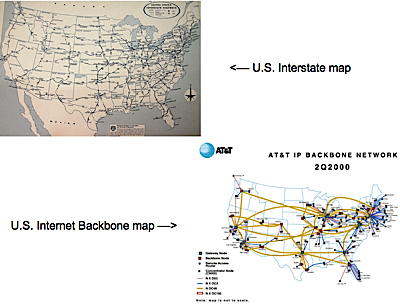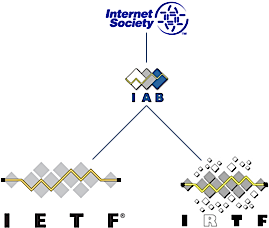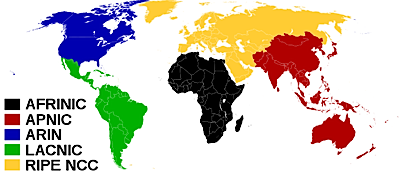Who owns the internet and how does it work?
Why do you have to pay for internet service? Why do you have to pay a registration fee for a domain name? Who's making all the money and what's it going toward? Who's in charge?
If you're like me you use the internet every day for a wide range of activities. But how do you know you can trust the internet if you don't know how it works, who's in charge, or who owns it? I've spent the last several years pondering that question myself and trying to come up with an answer. I've recently done a bunch of research and I think I've got a pretty good idea.
In order to tell you who owns the internet, I will need to explain who runs it and how it works. I'll start by giving you a quick overview, then I'll go through the whole internet piece by piece explaining how each step works, who's in charge of it, and who owns or controls them if they don't own or control themselves.
What is the internet?
I've broken the entire internet down to three pieces:
- Hardware
- Content
- Protocols
Each of those pieces can be broken down several more times.
Who owns the internet?
- Everyone
- No one
- A select few
Different major and minor pieces are owned by different people/organizations. I'll walk you through them starting with the hardware at the "top."
Whoever first called the internet the "Information Superhighway" knew what they were talking about. As you'll see, the internet isn't as different from our actual road system as you may think. Throughout the rest of this article I'll do my best to keep with that metaphor.
Similar to our roadway the internet has a backbone connecting all the smaller roads. For roadways we call this backbone the Interstate—the big, cross-country road capable of handling very large amounts of traffic. An Interstate is no different than a regular road in the sense that it's made out of concrete and allows vehicles to pass over it. Of course it's bigger and longer and doesn't have as frequent intersections, but otherwise it's made out of the same stuff that city streets are.

The internet has an analogous backbone called the Tier 1 network. The Tier 1 network consists of huge underground and even under-ocean cables that span the entire globe. Just as different states and countries manage the interstate, the Tier 1 network is owned and managed by private companies. There's only between 10 and 15 of them so I'll give you the list:
- AT&T WorldNet Services
- MCI Communications Services, Inc. d/b/a Verizon Business
- Sprint
- Qwest Communications Corporation
- COGENT Cogent/PSI
- AT&T Internet Services
- GBLX Global Crossing Ltd.
- TW Telecom Holdings, Inc.
- XO Communications
- Level 3 Communications
Of course highways and interstates would be pretty useless if they never had anywhere to get on or off. That's why they have junctions. Interstates are constantly intersecting other interstates and highways, sometimes across state lines and sometimes across country lines. Usually the entity who governs the particular stretch of highway an intersection is at is also responsible for that intersection. The internet is a little different in this regard because connecting two pieces of internet networking cable involves what's known as a router. For all intents and purposes a router is just a junction box that makes connecting different networks possible. Just as streets have little intersections and highways have major junctions, the internet has massive routers known as Internet Exchange Points or IXP's that link the backbone of the internet together. As one highway might have tons of intersections, each backbone cable of the internet also has many intersections. Because the amount of IXP's are far too numerous to mention, here's a link to the Packet Clearing House's list.
Just as there are all varying degrees of roads and intersections from interstates to city streets, there are smaller and smaller networks which comprise the internet. There are Tier 2 and 3 networks and they keep getting smaller all the way to the ISP's—the internet service providers—that bring the internet to homes and businesses across the world. All the networks, from the Teir 1 down to the ISP, are owned by companies. In fact, sometimes the same company—like AT&T—may own every step of the network. Because there are even more ISP's than there are any of the larger networks, I'll link you to a list of just some of the ones in Wisconsin, and more around the world
The final piece of hardware missing from this whole picture is the vehicles. You can build the roadway but if there's nothing on it then it's not much good. In my metaphor, the vehicles would be the servers that host the content and the computers that we all use to access the internet. A server is no different than a regular computer, other than it can process much more data in far less time. Servers also generally have much better internet connections than people do in their homes. You can think of serves as all the commercial vehicles on the road. Some servers transfer data—like semi trucks transfer products. Others provide services—like buses and taxies. As you probably already know, these servers and personal computers are owned by all kinds of people and organizations. A lot of companies that have their own websites have their own servers, and individual people own the computers they use to connect to the internet. There are also companies that own servers that individuals—or companies—can use to host a website. These are known as web hosts. There are thousands of these companies, but here are a few of the better ones in case you're interested are:
- DigitalOcean
- Rackspace
- Amazon Web Services (AWS)
You can think of these companies as private transportation services. You charter them for some amount of time—between one second and ten years—and they provide the agreed upon service for that amount of time.
Of course the roadway still wouldn't really be useful if no one had a purpose for driving. Sure, you could put cars on it and call it complete, but people having an incentive to use it is what makes it so valuable. On the internet the purpose is content and services. All those little web pages written by small web developers and large corporations make up the content. The content is also the services like email, social networking, and voice over IP (which is used to make phone calls across the net). These are the reason that people use this massive infrastructure. People drive to get places, so in a way you could credit all the conceivable destinations with fueling the creation and use of the roadways (this is actually true for the American National Parks). It's not just the destinations though; it's also the services. People ship things over our road system, just as people transfer files and other data across the internet. When the task comes to decide who owns the content, just think of it like the destinations and services. Your house, a park, or the corner store are just like web pages, and the mail service is just like email. I own my own website just like people own their own houses. Companies own their own website just like companies own their own building. The post office delivers mail and UPS and DHL deliver packages. Pretty much everyone owns the content part of the internet. If you have a facebook account you own part of the content on the internet. If you ever send email you own part of the content. The content is what the internet was built for.
The only thing left to make the internet work is the protocols. The content has to have some way of flowing over the hardware. The same thing is true with the roads. There are all kinds of protocols that make the roadways work. Obviously the most important ones are the laws—the rules that everyone must abide by. On the pavement, governments of varying levels set out the laws. Just as there is a federal government, state government, and municipal governments, the internet has a similar hierarchy for establishing law. There's an international association known as the Internet Society(ISOC) which according to their website is an "independent international nonprofit organization." Under the Internet Society is the Internet Architecture Board(IAB). Under them are two organizations called the Internet Engineering Task Force(IETF) and the Internet Research Task Force(IRTF). While the hierarchy breaks down further, this is as far as we need to go. The Internet Engineering Task Force is responsible for putting out a set of "laws" that are known as the TCP/IP suite, named after the two most important laws within it. The internet laws are published in what's known as the Request for Comments(RFC). There are tons of laws at different levels in the TCP/IP suite, just as there are tons of laws at different levels for the road. You only need to know that these laws exist to facilitate the organized flow of information on the internet.
There's an international association known as the Internet Society(ISOC) which according to their website is an "independent international nonprofit organization." Under the Internet Society is the Internet Architecture Board(IAB). Under them are two organizations called the Internet Engineering Task Force(IETF) and the Internet Research Task Force(IRTF). While the hierarchy breaks down further, this is as far as we need to go. The Internet Engineering Task Force is responsible for putting out a set of "laws" that are known as the TCP/IP suite, named after the two most important laws within it. The internet laws are published in what's known as the Request for Comments(RFC). There are tons of laws at different levels in the TCP/IP suite, just as there are tons of laws at different levels for the road. You only need to know that these laws exist to facilitate the organized flow of information on the internet.
While your car can drive without a license plate, your house can't get mail without an address. Everything attached to the internet needs to have what's known as an IP address. An IP address is freely and instantly provided to anyone with an internet connection. The system for providing these addresses is now built into the internet itself, but there still needs to be some regulation to prevent duplication. The same is true for license plates and house addresses. On the internet you can also get what's called a "domain name." This would be analogous to a novelty plate on a car. You pay a little extra for it and some company has to make sure that no one else has that novelty plate first. All the website names you know are domain names. Google.com, Facebook.com, Metamorphosite.com are all domain names. Behind each domain name is an IP address. The name is any easy thing for people to remember and it doesn't have to change. 12 digit numbers that are subject to change aren't very good for business, so as I mentioned before, anyone can pay to have a domain name linked to whatever their IP address may be.
The system for assigning these names is an interesting one. It all starts with an American company called the Internet Corporation for Assigned Names and Numbers(ICANN). According to their website, ICANN is a "not-for-profit public-benefit corporation with participants from all over the world." ICANN generally sets up the system but delegates all of the work to IANA, the Internet Assigned Numbers Authority. IANA operates at the highest international level of organization, but divides the work up further among the five Regional Internet Registries.  The map shows where these organizations govern. I'm under the jurisdiction of ARIN—the American Registry for Internet Numbers. These organizations sell blocks of numbers to Internet Service Providers(ISP's). Each ISP is then free to give out any of their assigned numbers to any of their customers. They also work with the domain name registrars who are like the companies that make the novelty plates. There are hundreds of registrars and you will need to work with one of them to purchase a domain name. The most common registrars are:
The map shows where these organizations govern. I'm under the jurisdiction of ARIN—the American Registry for Internet Numbers. These organizations sell blocks of numbers to Internet Service Providers(ISP's). Each ISP is then free to give out any of their assigned numbers to any of their customers. They also work with the domain name registrars who are like the companies that make the novelty plates. There are hundreds of registrars and you will need to work with one of them to purchase a domain name. The most common registrars are:
- Namecheap
- GoDaddy (listed for reference, don't ever use)
- eNom
- Tucows
- Network Solutions (The only one I trust).
- Melbourne IT
- 1&1
- Wild West Domains
- Register.com
- Moniker Online Services
- PublicDomainRegistry.com
They all charge around the same fee for a one-year domain name registration, which is $10, so if you're buying a domain name, don't pay much more than that.
The final thing that makes the internet flow nicely are common laws. We all know the rules of the road: pass on the left, use a turn signal etc. There's an organization which looks to write these laws in the scope of website standards—HTML and CSS. This organization is known as the World Wide Web Consortium(W3C). According to their website, "The World Wide Web Consortium (W3C) is an international consortium where Member organizations, a full-time staff, and the public work together to develop Web standards." They're constantly updating and refining the guidelines that govern the net. Unfortunately, just as with driving, there are people that don't follow these rules and places that have different rules. You know that asshole that doesn't use a turn signal then fly's by you on the right only to cut you off? The internet has that guy too, he's called Microsoft and he's driving a beat up old thing called Internet Explorer—which to the best of anyone's knowledge is incapable of following the simple rules of the road that everyone else does. To be blunt, I don't think there's a web developer alive that doesn't loath IE—I'm sure even the ones that work for Microsoft do.
I hope that all wasn't too confusing for you. You may be left with a sense of still not knowing what "the internet" is. The internet is everything I just explained. Just as the roadway is the concrete, the laws, the cars, the services, and the destinations. And as you can see, different pieces of the whole big picture are owned by different players. Some of them are private and some of them are public. Some of them are companies and some of them are people. Some of the organizations are American, and some of them are international. In that regard, both everyone and no one owns the internet, but as I just explained, that would be a bit misleading considering that there is some consolidation of wealth.